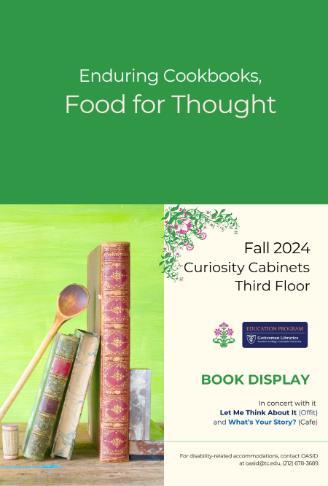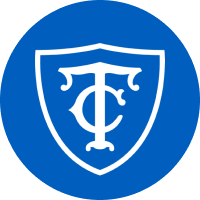Curiosity Cabinets: Enduring Cookbooks, Food for Thought
Third Floor
Libraries have many treasures awaiting us, for all through the literature and the art of the ages runs the subject of human food.
–Anna Barrows and Bertha Shapleigh, An Outline on the History of Cookery (Teachers College Bureau of Publications, 1925)
The cookery collection at the Gottesman Libraries reflects the earlier history and program of Teachers College, Columbia University. From the turn of the nineteenth century, courses were taught mainly by and to women on a variety of topics in the School of Household Arts, located in what is known as Grace Dodge Hall. Examples include: home cookery; the art, science, and technology of cookery; sugar cookery; economic aspects of food selection and preparation; food in business, hotel cookery; cookery problems of junior and senior high school teachers; recent research in cookery; meal planning; table service and decoration; food buying and marketing; new aspects of cookery teaching; and college cookery. Indeed, the Tudor Room, conceived in 1908 by Arthur Wesley Dow, Professor of Fine Arts, and Helen Kinne, Professor of Domestic Science, showcased meals and table service by students of cookery throughout the decades.
Under the leadership of Mary Swartz Rose, Professor of Household Arts from 1910-1923, cookery developed in “a world that knew little of calories, protective foods, vitamin contents, diet deficiencies”, not to mention the “fine instruments of measuring and weighing.” (Lawrence Cremin, et al. A History of Teachers College, Columbia University, Columbia University Press, 1954, pp. 56-57). Rose built the nation’s first college-level program in Nutrition Education. Her books and publications educated many, including hospital workers, food experts, researchers, and government officials, on the importance of diet.
Professor of Education and former Librarian Sidney Forman’s curiously doubted as to whether the cookbook collection would be important to the future academic program (Letter to Marcus A. McCorison of the American Antiquarian Society, 20 June,1969). Yet good recipe books, difficult to write, and still so highly popular in publishing, continue to tell a fascinating and relevant story – one that illuminates not only education, but history, cultural tradition, and personal narrative.
The cookbook collection at Teachers College was described by former Special Collections Librarian David Ment as “an artificial collection of manuscript recipe books”, with bound volumes of recipes; items drawn from the rare book collection and other sources; and open to additions as located or acquired” (Manuscript Collections, MG 35, Recipe Books, 1987). More books were added over time, allowing the Library to develop into an educational chronicle and special treasury of the art of cooking, at times with traces of kitchen usage on the very pages for students, teachers, and scholars.
Featured in this display are examples of the extraordinary, eclectic range of holdings, from cookery books in the children’s literature and curriculum collections, through to the research collections and archives. As rich educational, social, and personal texts, they inform our food traditions, our histories and cultures. From the 1500s to the twentieth century, international in scope, these works inspire thinking about food preparation and service; the place of food in school and society, in times of war and peace; and the warmth that cookbooks bring – the welcome kitchen as household center – to illustrate the enduring subject of food and the importance of preserving masterpieces that were created to be consumed.
Curated and designed by library staff, Enduring Cookbooks, Food for Thought is made possible through the continuing generosity of the Myers Foundations. This display builds upon themes of storytelling and food presented in the adjoining Offit Gallery, as well as Everett Cafe.
For additional insight, be sure to read From Kitchen Gardens to Calabria; The Culinary and Cookery Traditions and Teachers College.
Where: Third Floor
When: Fall Semester



